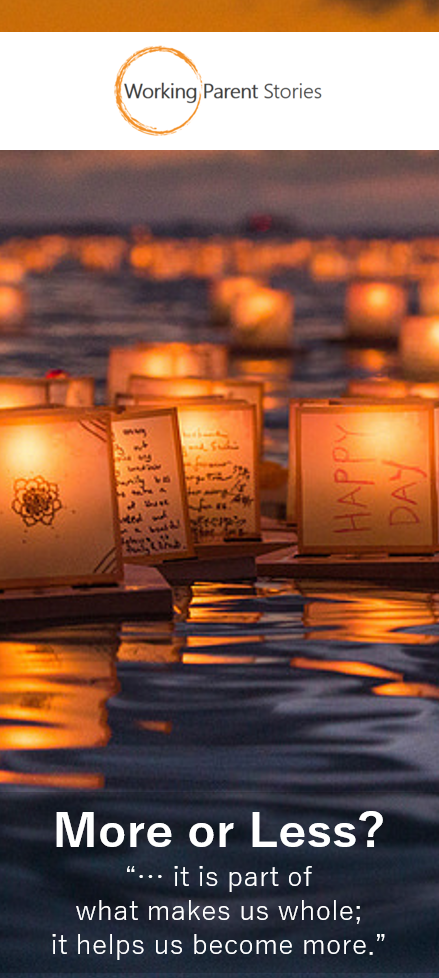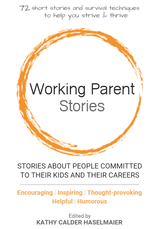|
Commentary about a Forbes article
Throughout life, we encounter people who encourage us to strive for more, while others (hopefully only a few) think we should strive for less. At least that's how it is for me. My husband comes to mind as a person who pushes me to strive for more, while my high school guidance counselor, who I only met once, surprisingly seemed to suggest that I should strive for less. (When I told her about my college plans, she asked, "Why would you want to do that? It will be really hard.") In hindsight, she did me a big favor because her comments served as a motivator when it did turn out to be really hard, and I struggled. Her words rang in my ears as I steeled myself to prove I could do it.
Why is it that some people want us to strive for less? I'm not sure, and figure that different people probably have different reasons. But at the end of the day, at least in my experience, striving for less rarely leads to contentment. It seems like most people are wired to be most content when they're contributing as fully as possible. Which, of course, brings me to work. And the role it plays in our lives. The most content people appear to seek out work (and other opportunities) that align with their capabilities and interests. When people are finished pursuing careers, or during their time off, they're often pursuing activities that look a lot like careers ... without the pay. That doesn't mean that people who aren't employed don't have more free time than those who are. Instead I mean that they often fill a surprising amount of that free time with activities that align with their capabilities and interests. Forbes recently published an article called "This Is What Success Means Now: Beause It's Not Just Paychecks and Promotions". Working parents may find it interesting, and their parents may find it insightful. Stop reading right now if you don't want to know how it ends. The final point seems like a bit of a stretch to me, but claims, "Work is no longer something that you have to do, it's something that you should want to do ... it is the way we become ourselves, not the opposite way around." While that final claim seems to ignore the fact that most people work so that they can support themselves and their families financially, I think they're spot-on in in terms of recognizing that when we find a fulfilling job, it is part of what makes us whole; it helps us become more. People sometimes asked me why I worked. My husband had a good job; we didn't need the money. The thing was, I wanted more; more contribution, more challenge, more satisfaction, more recognition. More for myself, more for my community, and more for my kids. I wanted the satisfaction and fulfillment that only a career could provide. I wanted to set an example for my children and other people too. I loved challenges and enjoyed the experiences (most days). I wanted more. If you're reading this, you probably want more too.
0 Comments
Leave a Reply. |
The StoriesArchives
March 2022
Categories
All
|
Photos from barnimages.com, marcoverch, truewonder, donnierayjones, marcoverch, shixart1985, Gustavo Devito, edenpictures, nan palmero, quapan, The Pumpkin Theory, bark, opassande, Semtrio, Ivan Radic (CC BY 2.0), verchmarco (CC BY 2.0), Didriks, shawnzrossi, shixart1985 (CC BY 2.0), madprime, marksmorton, CT Arzneimittel GmbH, NwongPR, franchiseopportunitiesphotos, anotherlunch.com, jdlasica, wuestenigel, Frinthy, romanboed, Doris Tichelaar, quinn.anya, A_Peach, VisitLakeland, MEDION Pressestelle, Darren Wilkinson, bratislavskysamospravnykraj, Anthony Quintano, Danielle Scott, pockethifi, Bridgette Rehg, Martin Pettitt, PersonalCreations.com, wuestenigel, Thad Zajdowicz, archer10 (Dennis) 139M Views, Infomastern, beltz6, The National Guard, futurestreet, daveynin, OIST (Okinawa Institute of Science and Technology), Rinet IT, shixart1985, mikecogh, JeepersMedia, Ryan Polei | www.ryanpolei.com, Jake.Christopher., aleksandrajovovich, thepeachpeddler, wwward0, flossyflotsam, Got Credit, Senado Federal, Corvair Owner, lookcatalog, moodboardphotography, dejankrsmanovic, Carine fel, ElleFlorio, {Guerrilla Futures | Jason Tester}, greg westfall., Arlington County, mariaronnaluna, quinn.anya, wuestenigel, Tayloright, insatiablemunch, MrJamesBaker, Scorius, Alan Light, Monkey Mash Button, www.audio-luci-store.it, wohlford, Vivian Chen [陳培雯], okchomeseller, BoldContent, Ivan Radic, verchmarco, donnierayjones, Czar Hey, US Department of Education, Andrew Milligan Sumo, Michel Curi, anotherlunch.com, ProFlowers.com, Cultural viewpoints from around the world, alubavin, yourbestdigs, Rod Waddington, Tayloright, Wonder woman0731, yourbestdigs, donald judge, Thomas Leth-Olsen, Infinity Studio, shixart1985, wuestenigel, francesbean, Roger Blackwell, MrJamesBaker, Luca Nebuloni, MFer Photography, erinw519, boellstiftung, North Carolina National Guard, A m o r e Caterina, MrJamesBaker, bellaellaboutique, Free For Commercial Use (FFC), Prayitno / Thank you for (12 millions +) view, wuestenigel, Matt From London, MadFishDigital, Kompentenzzentrum Frau und Beruf, mikecogh, CreditDebitPro, marciadotcom, Mr.Sai, _steffen






 RSS Feed
RSS Feed